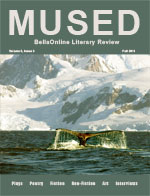Deep Roots
Sue Babcock
The morning sun crested the mountains as I used a pick, chipping loose dirt encasing the dead root. Dry air heated up as I leaned the pick against the house and grabbed a shovel to clear away the rubble. I swung an axe over my head and brought it down with a thud as it bit into the stubborn root. Inch by inch I deepened the hole. Sweat dripped from my face, using the wrinkles around my eyes and mouth as channels. A musty smell of dry earth filled the air. My heart and lungs screamed, an alarm clock buzzing across eons of life, reminding me of my age as I paused, leaned for a minute on the axe or pick or shovel handle, and waited for my heart to regain control. I licked my lips to ease the cotton-dry feeling in my mouth and started again.
Nearby, my husband slogged through his chores. He crossed the yard, peered into the hole, shook his head and returned to cleaning out the pigeon coop. I stared after him, my heart on the edge of contempt.
He’s a tough old bird: beer-bellied, white haired, part sergeant eaten up in his youth by a war in a jungle our country never intended to win, part co-worker who saved my butt more times than I can remember, part husband, and all male. He spends his days outside, swallowed by tasks to keep him from remembering. He lives off the energy of the trees and animals contained on our small suburban dream, a dream firmly planted in the northeast corner of Albuquerque; a dream we’ve lived on and fed off of for over thirty years.
###
A tree, nurtured for years by my husband against all odds, died over the winter. Temperatures plummeted this year to negative fifteen degrees Fahrenheit. Yes, that is forty seven degrees below freezing in a region that feels freezing is too cold. Temperatures remained at these frigid levels for days, forcing schools to close because Texas had rolling blackouts that shut down the gas lines into New Mexico during the coldest temperatures we’d seen in sixty years. Makes you wonder what kind of politicians rule the world, doesn’t it? People used electric heaters in desperate moves to stay warm, causing several house fires, leaving families who could least afford it homeless. The death of our tree was a small thing compared to what folks in some towns experienced.
Still, the tree was dead. We waited through spring to see if the tree, a lovely mimosa that had bloomed for more than a dozen years outside our kitchen window, would bud and blossom despite the cold winter and dry spring. The tree had been a volunteer, planted by winds and fate when our daughters still lived at home, before they had grown up and had families of their own, and when a favorite dog, now also dead, was a puppy and chewed on the bark until my husband wrapped the trunk in hardware cloth. The tree flourished; loved and watered and protected by my husband whose very life was reflected in its feathery blossoms and fern-like leaves.
As the summer solstice approached, we rose above our denial and faced the job of cutting the tree down.
Albuquerque, in addition to chalky dry springs and bone-chilling winter, has really, really crappy soil. We live near foothills where mountains curve downward into an alluvial valley. Eons of granite have worn away, creating a soil filled with pebbles, caliche, and dry sandy arroyos. And no organic material. None. Nada. When housing developments spread like snakeweed across barren landscape, construction crews brought in even worse soil, if this were possible, to use as fill.
So our backyard is a composite of calichified sand and pebbles, as hard as my husband’s head. Plain old dirt. Professors used to correct me about the word “dirt.” “It’s soil,” they’d say, “regardless of what it consists of.” To me, though, what we have under our fingernails and in our backyard is impossibly cemented dirt.
###
“Looking isn’t going to get this hole dug,” I said, my voice raspy from dirt and exertion, as he took yet another break from his chores to check on my progress.
“You need to use the axe to take out those roots,” he said as he pulled the hose across the yard and cleaned the feed trays and water dishes for the racing pigeons he raised. Minutes later he crossed the yard again, gazed at the hole and frowned. I could feel the vibes pouring off of him, wordlessly wondering why I wasn’t done yet.
I glared at him, wordlessly wondering why we were still married. He returned to his chores.
I panted, my heart beat so hard I felt it in my throat and head, sweat dripped into my eyes and onto the lenses of my glasses, gritty dirt filled my shoes, covered my pants, and swirled into my nose and ears as I scooped it out of the ever deepening hole with leather-gloved hands.
He crossed the yard again, stared at the hole, frowned and said in that authoritative voice of his, “It needs to be deeper.”
This time he’d gone too far. I swear to you the dirt beneath my feet growled; a growl I felt, as distinct as thunder. It traveled up my legs, gathering strength until it reached my heart. It swelled in my throat. I could no longer contain it, as I cannot contain lightning, and a laugh erupted into the hot air.
He raised his grizzled eyebrows and smiled. A smile that said he knew he had gone too far. My world lit up, my heart danced. Even as he handed me a bottle of cold water, I knew why we were so good together.

